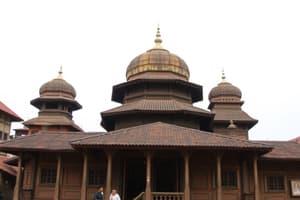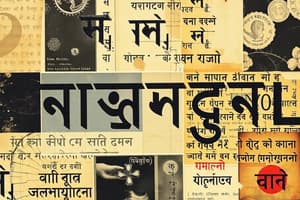Podcast
Questions and Answers
Why is the Language Movement considered a significant aspect of Bengali identity?
Why is the Language Movement considered a significant aspect of Bengali identity?
- It was a struggle for the official recognition of Bengali, reinforcing cultural pride. (correct)
- It led to the standardization of Bengali dialects, promoting regional unity.
- It established a strong tradition of theatre, known as Jatra, across Bengal.
- It resulted in the creation of numerous online dictionaries and language learning resources.
A researcher aims to study the impact of social media on the Bengali language. Which area would be most relevant to investigate?
A researcher aims to study the impact of social media on the Bengali language. Which area would be most relevant to investigate?
- The role of Bengali newspapers in shaping public opinion.
- The variations in pronunciation across different Bengali dialects.
- The use of Bengali on platforms like Facebook and Twitter. (correct)
- The influence of Jatra performances on contemporary social issues.
What is the primary goal of efforts aimed at standardizing the Bengali language?
What is the primary goal of efforts aimed at standardizing the Bengali language?
- To discourage the use of Bengali on social media platforms.
- To ensure mutual intelligibility among different regional variations. (correct)
- To promote regional dialects over a unified language.
- To preserve the historical accuracy of Jatra performances.
How does learning Bengali contribute to a broader understanding of the Bengali-speaking world?
How does learning Bengali contribute to a broader understanding of the Bengali-speaking world?
UNESCO's recognition of International Mother Language Day on February 21st directly acknowledges the significance of which event?
UNESCO's recognition of International Mother Language Day on February 21st directly acknowledges the significance of which event?
Which of the following characteristics is NOT typical of Bengali grammar?
Which of the following characteristics is NOT typical of Bengali grammar?
Which script is the Bengali script derived from?
Which script is the Bengali script derived from?
Which of these languages did NOT influence the vocabulary of Bengali?
Which of these languages did NOT influence the vocabulary of Bengali?
Which literary style is considered the more colloquial standard of Bengali?
Which literary style is considered the more colloquial standard of Bengali?
Which of these figures is most associated with Bengali cinema, also known as Tollywood?
Which of these figures is most associated with Bengali cinema, also known as Tollywood?
What is the significance of the Language Movement of 1952 in the context of Bengali?
What is the significance of the Language Movement of 1952 in the context of Bengali?
Which of the following is a characteristic of the Bengali script?
Which of the following is a characteristic of the Bengali script?
Which of the following best describes the relationship between Bangla and Bengali?
Which of the following best describes the relationship between Bangla and Bengali?
Flashcards
Language Movement
Language Movement
A movement for Bengali to be an official language. UNESCO recognizes it as International Mother Language Day on Feb 21.
Bengali Dialect Variation
Bengali Dialect Variation
Dialects changing in pronunciation and vocabulary across different areas.
Jatra
Jatra
Traditional Bengali theater that often shows mythological stories, historical events, and social issues.
Bengali Media Influence
Bengali Media Influence
Signup and view all the flashcards
Online Bengali Resources
Online Bengali Resources
Signup and view all the flashcards
What is Bengali?
What is Bengali?
Signup and view all the flashcards
How many native Bengali speakers are there?
How many native Bengali speakers are there?
Signup and view all the flashcards
Where is Bengali the official language?
Where is Bengali the official language?
Signup and view all the flashcards
What is Bengali's word order?
What is Bengali's word order?
Signup and view all the flashcards
What are the two main literary styles of Bengali?
What are the two main literary styles of Bengali?
Signup and view all the flashcards
Who was Rabindranath Tagore?
Who was Rabindranath Tagore?
Signup and view all the flashcards
Name some styles of Bengali music.
Name some styles of Bengali music.
Signup and view all the flashcards
What is Bengali cuisine known for?
What is Bengali cuisine known for?
Signup and view all the flashcards
Study Notes
Ok, here are the updated study notes:
- Bengali is an Indo-Aryan language.
- It evolved from Sanskrit, Pali and Prakrit languages.
- It is spoken mainly in Bangladesh and the Indian states of West Bengal, Tripura and Assam's Barak Valley.
- There are approximately 250 million native Bengali speakers worldwide, making it one of the most spoken languages.
- In Bangladesh, Bengali is the official language.
- In India, it is one of the 22 scheduled languages.
- The Bengali script is derived from the Brahmi script.
- It is an abugida, where vowels are inherent in consonants.
- Vowels can have independent forms or be represented by diacritics attached to consonants.
- Bengali grammar is characterized by having a subject-object-verb (SOV) word order.
- Nouns are not marked for gender.
- Verbs are highly inflected, marking tense, aspect, mood, and person.
- Honorifics are an important feature of Bengali.
- Different verb forms and pronouns are used to show respect.
- The vocabulary of Bengali has been influenced by Sanskrit, Arabic, Persian, English, and other languages.
- There are two main literary styles: সাধু ভাষা (shadhu bhasa) and চলিত ভাষা (cholito bhasa).
- সাধু ভাষা (shadhu bhasa) is a more Sanskritized form
- চলিত ভাষা (cholito bhasa) is a colloquial standard
- Bengali literature has a rich history.
- Notable medieval poets include চণ্ডীদাস (Chandidas), কৃত্তিবাস ওঝা (Krittibas Ojha), and মুকুন্দরাম চক্রবর্তী (Mukundaram Chakraborty)
- Rabindranath Tagore was a Bengali polymath who won the Nobel Prize in Literature in 1913.
- কাজী নজরুল ইসলাম (Kazi Nazrul Islam) was a revolutionary poet and musician.
- Other prominent writers include শরৎচন্দ্র চট্টোপাধ্যায় (Saratchandra Chattopadhyay) and বঙ্কিমচন্দ্র চট্টোপাধ্যায় (Bankimchandra Chattopadhyay).
- Bengali music includes a variety of styles, such as Rabindra Sangeet, Nazrul Geeti, and Baul music.
- The Baul tradition is a unique form of folk music with mystic themes
- Bengali cinema, also known as Tollywood, has a distinct identity.
- Satyajit Ray was an internationally acclaimed Bengali filmmaker.
- Ritwik Ghatak and Mrinal Sen are also notable directors.
- Durga Puja is the most important festival for Bengali Hindus
- Other festivals include Poila Boishakh (Bengali New Year) and Eid.
- Bengali cuisine is known for its rice, fish, and lentil dishes.
- Popular dishes include fish curry (machher jhol), biryani, and sweets like রসগোল্লা (roshogolla) and সন্দেশ (sandesh).
- Bengali language is also referred to as Bangla.
- The language movement of 1952 in East Pakistan (now Bangladesh) was significant.
- People protested for the recognition of Bengali as an official language.
- This movement is an important part of Bengali identity.
- UNESCO recognizes 21st February as International Mother Language Day in recognition of the Language Movement
- The dialects of Bengali vary across regions.
- Variation exists in pronunciation and vocabulary.
- Efforts are directed towards standardization to ensure mutual intelligibility.
- There is a strong tradition of theatre in Bengal, known as যাত্রা (jatra).
- Jatra performances often depict mythological stories, historical events, and social issues.
- There is a growing body of contemporary Bengali literature.
- Many writers are experimenting with new forms and themes.
- Bengali newspapers and magazines have a wide readership.
- They play an important role in shaping public opinion.
- The influence of social media is growing on the Bengali language.
- Many use Bengali on platforms like Facebook and Twitter.
- Online dictionaries and language learning resources are available.
- These tools are making it easier to learn Bengali.
- Learning Bengali can provide insights into Bengali culture, literature, and history.
- It can also connect individuals with Bengali-speaking communities around the world.
Studying That Suits You
Use AI to generate personalized quizzes and flashcards to suit your learning preferences.




